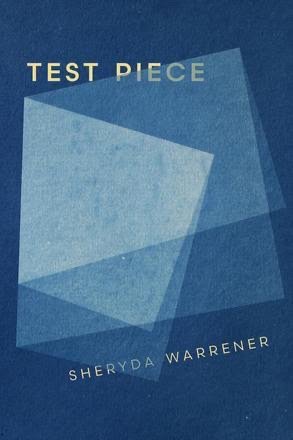Book Review of Test Piece by Sheryda Warrener, by Robin L Harvey
At the public launch of her latest poetry collection, Test Piece, Sheryda Warrener chose to read her poem “On a Clear Day”. It was a kind choice, because of all the poems in the UBC creative-writing teacher and Artspeak presenter’s third book, it was most accessible for any listener’s intellect.
The line, “A clear domestic space is a clear psychic space” appears twice, near the start and near the end of the poem acting as an anchor for the poet’s inner voice. She wakes up “an empress laid out on a marble slab, gold coins over my eyes.” Snippets from the poet’s day-in-the life, like morning coffee and reading, are artfully captured in the phrases, “Dollop of whip in coffee lifts my espirit” and “a little contact high from language.”
Working mothers will all relate to this phrase: “Before: email, class prep, mamahaveyouseenmy??? – I make my move.” Warrener created all seventy-three pages of Test Piece, the five poems and the four palimpsests - photo imagery with text under and overlays – that serve as visual art dividers for the written work.
Her engaging, lyrical imagery enchants throughout much of the book. An example: “flowers whorl on vines like sheets through dryer portals”– a blend of the imagined and mundane that uplifts the reader with an act as ordinary as doing laundry. Nuanced, graceful and precise word choices are part of Warrener’s “collage mode” that reflect the author’s minimalist vision in word and art, her “meditations” that “engage with the process and practice of … abstract minimalist” artists and poets she admires.
Listed among them are Eva Hesse, Anne Truitt, Agnes Martin. Etel Adnan, Deborah Landau, Heather Christle and Mary Reufle. Test Piece reflects the delicate, complex inner musings of a woman whose life and work have split influences, split between the poem’s topics – most from her own life - and her near-obsession with minimalist visual art forms and their visual-textual impact in literature.
The opening poem is the shortest at barely two pages. Entitled Crushed Velvet it reflects on a lack of and longing for connection. “Day’s touchlessness reverse” Warrener writes, when at the pharmacy a staff member applies a product and with “lukewarm water …makes a tidy package with the towel, unwraps the gift of my own hand.”
A Fixed Point, the second poem in the book, is tightly structured linguistically but topically disjointed. It begins well with a visceral reflection on Walker Evan’s photograph entitled Alabama Tenant Farmers Wife.
“Nothing disrupts that level stare,” Warrener writes juxtaposing her own “fraudulent matte-red mouth, thin-ribbed knit” against the weathered fierce intensity of the woman in a “cotton floral dress,” with her “hair’s scattered part, lip bite, hardened brow.”
However, the reader is then jolted through several scenes; a psychic reading, a memory of streaming a film, landing again at a video installation where a “triptych” of teenagers and the poet view an eight-thousand-year-old carved female figure.
In Test Piece the poet aims to inhabit the space where prose intersects with visual expression. Poems like Crushed Velvet and On a Clear Day succeed very well. A Fixed Point has mixed success, and A Blue Filter, inspired by a white glove that sparked a memory of travelling in the Tokyo subway system, has much promise that it never realizes.
The title work, Test Piece after Eva Hesse, is disjointed and elusive. Inspired by artwork that hangs in Washington’s National Gallery that is made of a strip of cheesecloth in gradations of yellow and hung on a dowel, the poem is a version of concrete poetry. At nine pages, Warrener tries to conquer that genre’s limitations by using longer lines, a snippet paste-on from another poem and mirrored, right and left centred typography. Yet the content is overwhelmed and obscured by the layout.
Visual art and artistic presentation can intersect well with style and linguistics in poetry. But making this such a dominant emphasis may be an error. The book has so much blank space, this valuable work appears, at first glance, to lack enough content for a full book.
However well-executed Test Piece’s design, “at first glance” is important for sales. Given its price, readers may link to it online, or pick it up, open it and consider it flimsy. With a unique talent like Warrener, who breathes in the abstract, and, at her best, exhales her creative heart out, this would be a shame.
Book Review of Test Piece by Sheryda Warrener, Coach House Books, 73 pages, paperback $22.95, E-books, $15.95

